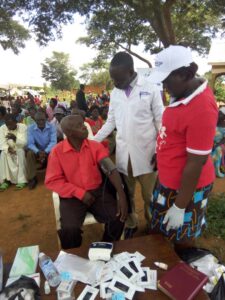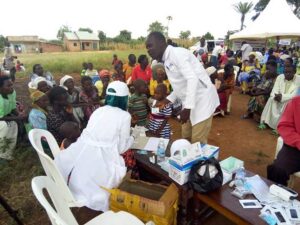Currently, 7.2 percent of Uganda’s population is living with HIV/AIDS. This amounts to an estimated 2 million people, which includes 220,000 children. An estimated 62,000 people died from AIDS in 2016, and the figures did not change much in 2017 and 2018. 1.9 million children have been orphaned by Uganda’s devastating epidemic. HIV/AIDS prevalence has been rising since its lowest rate of 6.4 percent in 2006. New infections are diagnosed in 170,000 people a year, of whom 25,000 are children. Despite this, the 2014 life expectancy of 55 years is nine years higher than the expectancy in 2000, likely to be a result of greater access to treatment for people living with HIV.
To realise its mission, LUCOF is executing the following HIV/AIDS prevention, care and support campaigns;
Comprehensive HIV/AIDS Education and sentisation
We sensitize people about HIV/AIDS prevention with primary focus on women, children, the youth and the general community. By means of IEC (information, education and communication), we try to reach as many people as we can through seminars, workshops, drama/video shows, written material and various other means. We promote behavioral change, reduce risky behaviors and address negative social norms through innovative communication activities. Our volunteer teams help secondary schools to set up HIV/AIDS clubs and our teams then work further to educate or provide resources to the clubs. Our primary instrument and weapon since our start has been the use of the ABC method (Abstinence, Be faithful and Condom use, in attempt to teach out communities)
Voluntary Counseling and Testing services (VCTSs)
In close collaboration with partner organizations such as Madina Medical centre, Kiwoko hospital, Buganda youth council, LUCOF carries out voluntary counseling and testing to enable people to know their HIV/AIDS status, with the aim of reducing the further spread of HIV/AIDS in the community.
Community outreaches
LUCOF Hope for the Aged, Childnet, Youthnet and BELUNA women support those who are vulnerable as a result of HIV/AIDS. This includes elderly individuals whose children have died of HIV/AIDS as well as families in the community who have been affected by the disease. We offer material support in the form of medicines, money, water supply, community support, clothes and foodstuffs, while also providing psycho-social support and counseling. We provide a range of family planning education and resources at house hold level. These include information on child spacing, breast feeding, disease prevention and health promotion.



Orphan Support projects
LUCOF Childnet supports orphans who have lost their parents to HIV/AIDS, as well as other vulnerable children who might be infected themselves or whose parents are sick. We do this by securing sponsorship to pay for primary and secondary education, scholastic materials, and by providing clothing and food when necessary. We promote life skills, entrepreneurship and business to these households in order to increase their incomes and cope up with financial challenges. Our LUCOF child clubs LCC have helped infected and affected children learn what to do in order to promote the health, wellbeing and development of themselves, families and communities
Youth Health
LCOF supports youth health activities in the community through its Youthnet department by training of Youth Peer Educators and youth clubs. This helps adolescents make responsible decisions concerning their sexual reproductive health in an effort to reduce the further spread of HIV/AIDS among young people. We offer peer education to the OVCs, young mothers and the youth in ensuring behavioral change and not to spread the virus
Promoting and supplying condoms
LUCOF supplies condoms free of charge to people during seminars, community outreaches, house to house sensitisations, at entrepreneural seminars , etc We also offer comprehensive sensitization and training in correct condom use. We target specific groups who are at greater risk of HIV/AIDS infection (and other STDs), such as sex workers, long-distance truckers, urban motorcyclists (boda-bodas), and discordant couples (i.e. couples in which one partner is HIV positive and the other is negative).
Reproductive health/HIV integration
We offer contraceptive methods and services when and where other healthcare services are offered, to increase client access to the information and care needed to manage sexual and reproductive health.
Voluntary Male Medical Circumcision
We circumcise male to ensure hygiene and reduce on the HIV risk, since scientists prove that circumcised men are at a lower risk of contracting HIV.
Uganda Registration: S.5914/11502
Nederland Registratie: Kvk-nummer 83487166
BTW-Identificatienummer: NL862892983BO1